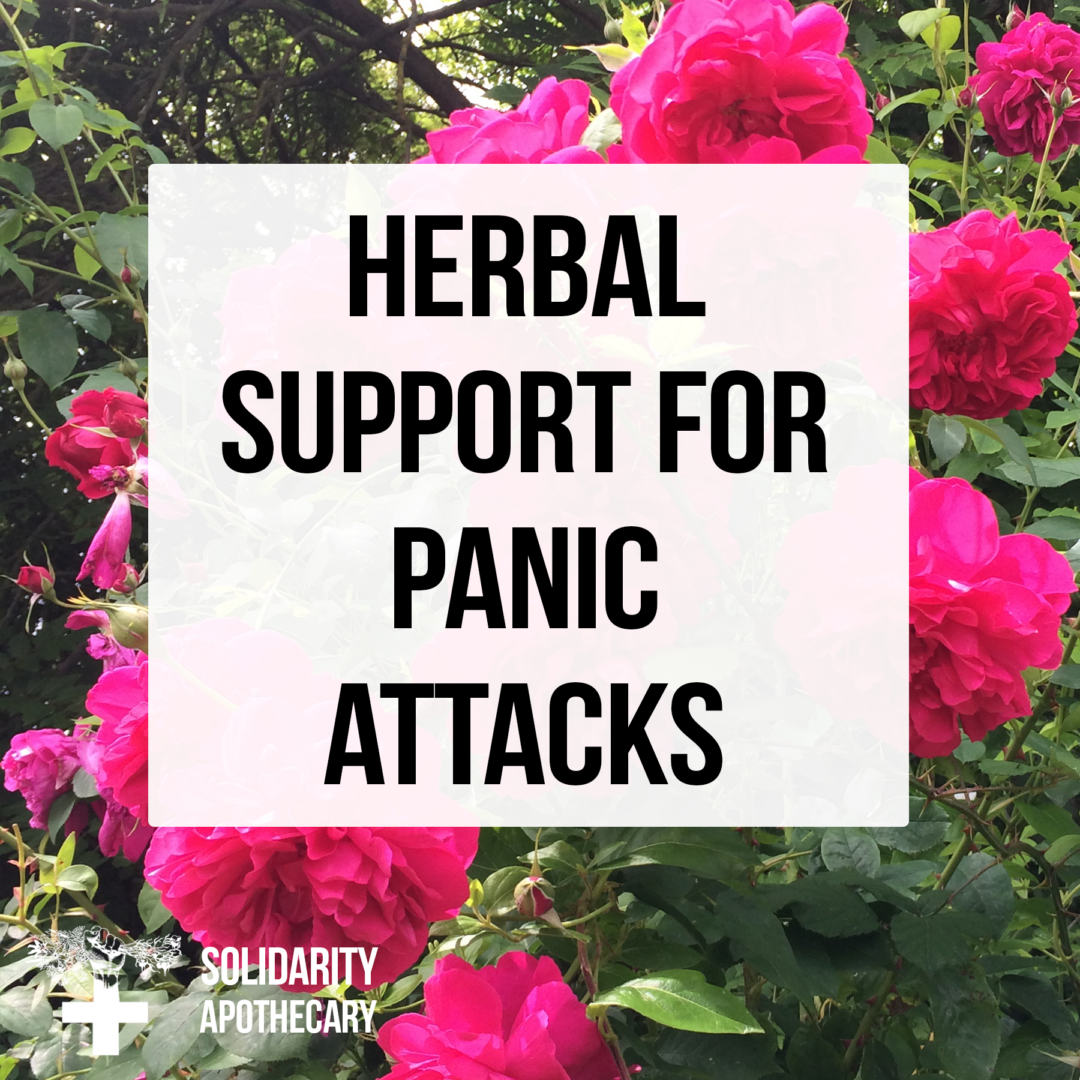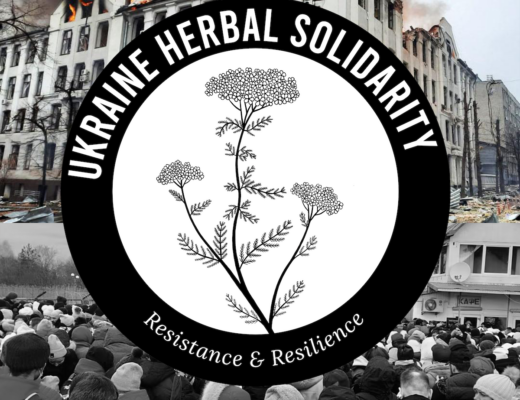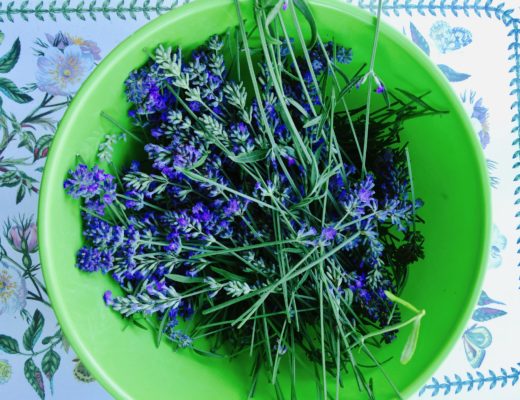Now let’s look at herbal support during a panic attack. What can you take in that moment to help calm you down?
Herbal support during a panic attack
For me, all plants that you have a relationship with can support you in a panic attack. If you have a relationship with a plant and taking that plant makes you feel safe, calm, supported, and strengthened then I think those are the herbs that you want to be reaching towards during a panic attack. There are also some go-tos that herbalists often recommend
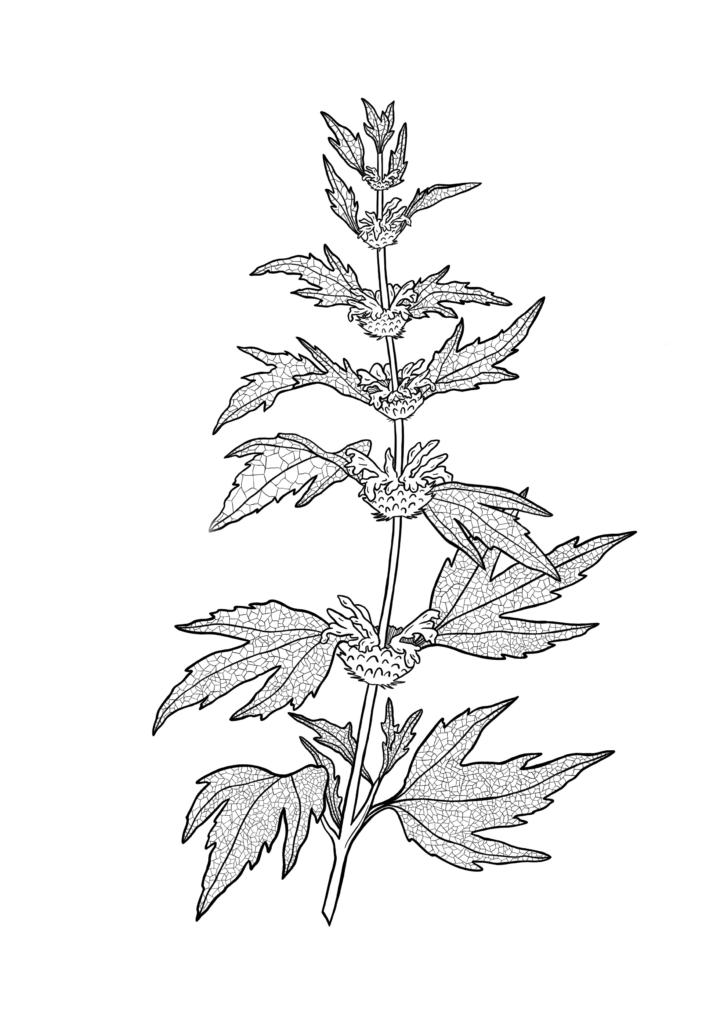
Motherwort
Let’s start with Motherwort, Leonurus cardiaca. This herb is very strongly indicated for panic. attacks – it has an affinity with the chest particularly. Whether that’s easing a sensation of rising anxiety in the chest or literally helping to reduce heart palpitations, Motherwort can bring an instant relief through its strong, relaxing action.
Motherwort is a herb that reminds you to breathe. It has cardiotonic properties which are really useful in treating high blood pressure. And it’s got so many other amazing medicinal actions. It’s definitely my number one herb for panic attack blends..
Ways to make & work with: Generally, it’s recommended as a tincture, which is an alcohol-based medicine, and not everyone can consume alcohol. Glycerites are possible.
I’ve found it very effective in drop doses, so during a panic attack, taking fifteen drops, directly on my tongue or having it in some water.
A safety note: avoid Motherwort during pregnancy due to its emmenagogue action (that stimulates menstruation).
“There is no better herb to drive melancholy vapors from the heart to strengthen it and make a merry cheerful blind soul than this herb. Therefore, the Latins called it Cardiaca.”
– Nicholas Culpepper, 16th Century Herbalist
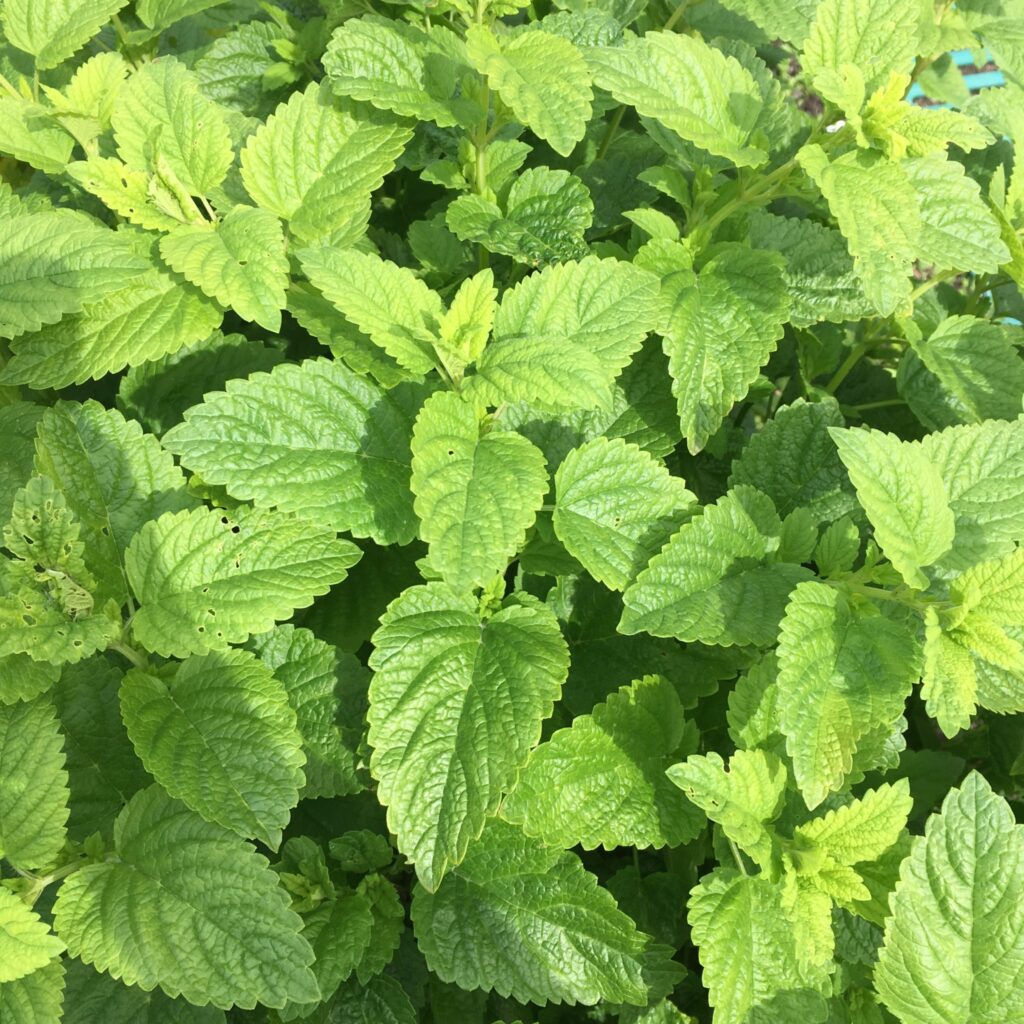
Lemon Balm
Next is Lemon Balm, Melissa officinalis. In my experience it’s the most beautiful, safe, and wonderful herb that just seems to benefit everyone who takes it. During a panic attack itself, having a swig of Lemon Balm goes a long way to help me feel soothed and calmer. It has this wonderful, fast-acting, relaxing action, which is what we need during a panic attack.
It’s a wonderful nervine relaxant that can help us move into a more parasympathetic state. Its volatile oils act directly on the limbic system, which is the part of the brain involved in our behavioural and emotional responses.
It can reduce tension through lowering blood pressure and can relieve heart palpitations. And lemon balm is fantastic for people who express a lot of distress in their digestive system. If you’re that person who gets irritable bowel type symptoms when you’re experiencing a lot of emotional stress, then lemon balm is a fantastic ally because it has a lot of affinity with that gut-brain-axis.
Ways to make & work with: In my experience, lemon balm is amazing as a glycerite. A glycerite is when a medicinal substance is combined with glycerine. It captures the volatile oils really well and it’s much stronger and sweeter than a tincture.
Not everyone can consume alcohol-based medicines and we need to be able to make medicines that can support people who are
pregnant, who maybe avoid alcohol for health reasons, children, the elderly, for example or for religious reasons. Lemon balm is also a wonderful tincture. The tea in the summer from fresh leaves is absolutely beautiful.
A safety note: It’s generally avoided during pregnancy, in the first trimester, but otherwise it can be used safely in later pregnancy. Be careful with low blood pressure, antidepressant, and sedative medications.
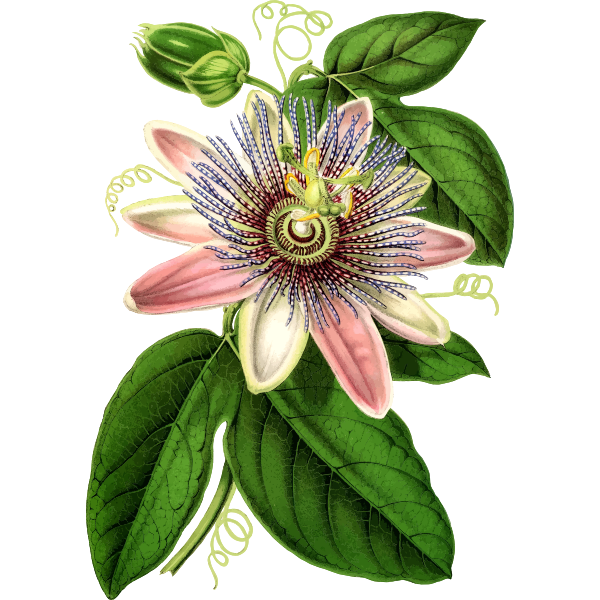
Passionflower
Next up is Passionflower, Passiflora incarnata. Passionflower is famous for being a fantastic ally for sleep disturbances and insomnia. Sometimes herbs get pigeonholed a bit and passionflower has often been seen only in this night-time, sleep-support category but I think it’s very underestimated as a nervine. It’s fantastic in daytime blends to support with reducing sympathetic activation.
Unless someone was severely hyper-aroused or triggered, I probably wouldn’t give it on its own in the daytime. A little bit goes a long way, especially in combination with other nervines. For people who are experiencing strong baseline anxiety it can be helpful as passionflower can help ease anxiety and racing thoughts.
Racing thoughts are interesting. A person might be in a particular kind of thought loop of feeling in danger, for example, and then that can build towards a panic attack. Passionflower is fantastic at addressing that.
It’s also an antispasmodic, so it’s indicated for muscle pain and digestive distress or period pains. It can reduce blood pressure and has a relaxant effect on the entire body.
Ways to make & work with: In terms of medicine forms, it’s recommended as a tincture or as a glycerite. I’ve never had enough fresh passionflower to make a big batch, but I have made a fantastic passionflower glycerite using dried passionflower and a warming method in a slow cooker.
It’s also great as a tea but for panic attacks, I find the tincture most effective – just adding fifteen drops to some water or taking it directly on the tongue. And I sometimes take a swig of glycerite from the bottle which I find really effective for me.
A safety note: it is recommended to avoid passionflower in pregnancy (with some nuances to this) and caution with other antidepressants, barbiturates, and sedative medications because of its sedating nature. pressure, antidepressant, and sedative medications.
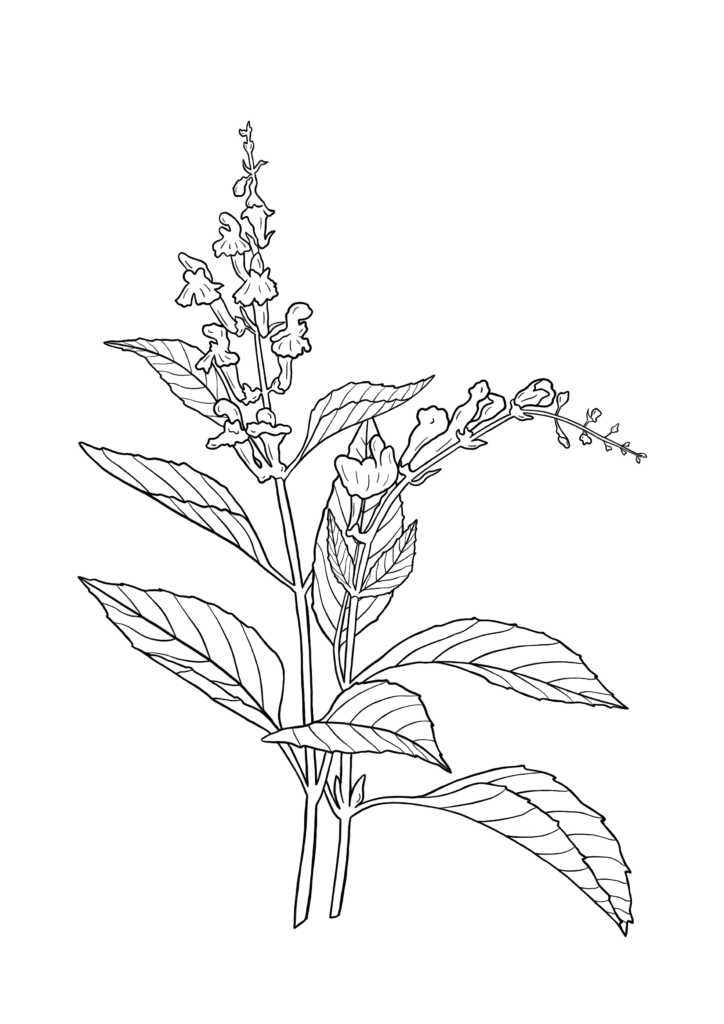
Skullcap
Next is Skullcap, Scutellaria lateriflora. There are many different types of skullcap around the world. I place it in the hypnotic nervine category because it has a sedating effect. In my experience, it can almost instantly put you in a parasympathetic, rest and digest state.
It’s also a fantastic nerve tonic. It’s full of B vitamins and nutritive constituents that are fantastic for our nervous system. It’s something I support people with medium-term. So if someone has a lot of bad anxiety, and a parasympathetic state is unfamiliar to them, I might recommend an infusion of skullcap before bed for six or even eight weeks at a time. In terms of panic attacks, skullcap helps with acute distress.
Ways to make & work with: Similar to the other plants, fifteen drops of the tincture directly on the tongue is really effective. I have made skullcap glycerite which I don’t find to be strong enough. I think the tincture is faster-acting. And skullcap tea is great for that sort of hangover time after a panic attack.
A safety note: Avoid skullcap in pregnancy. Use caution when nursing or breastfeeding and also with antidepressant medications. Avoid when driving due to its sedative action.
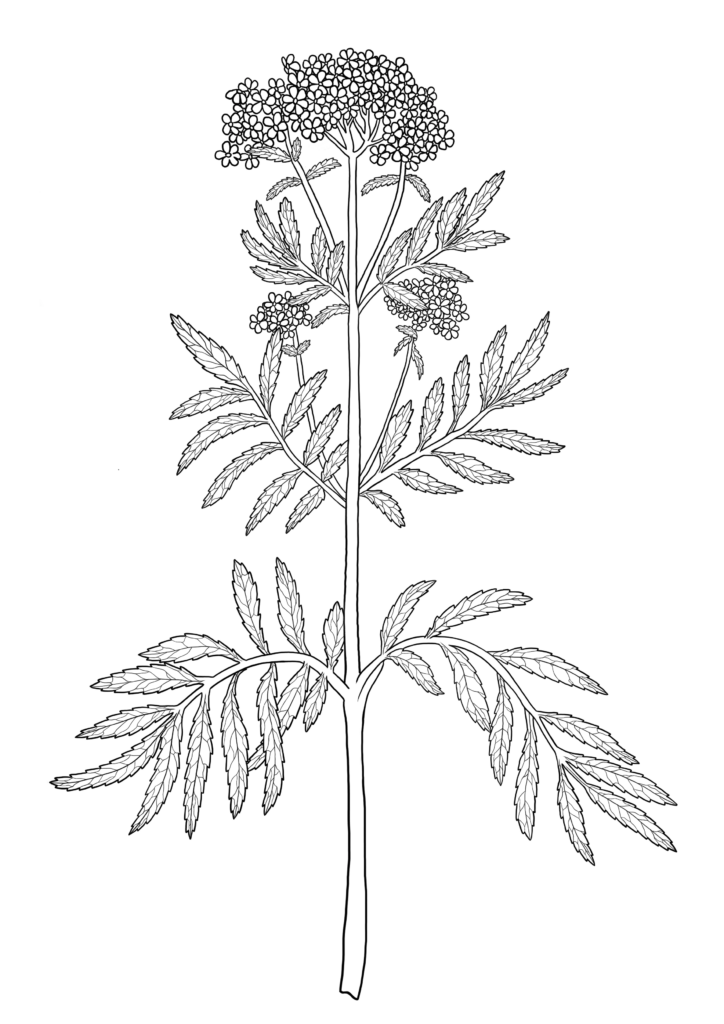
Valerian
And the last herb I want to mention for supporting with panic attacks is Valerian, Valeriana officinalis. It’s got loads of different herbal actions and unlike other nervines in this context, it’s actually quite warming. For the people it’s effective for, valerian has a great sedative action, but it’s not for everyone.
Some people find valerian very stimulating. Unfortunately, I’m one of those people, so if I take valerian at night, it will keep me awake and if I fall asleep, I will have very active nightmares. So be aware when trying valerian and check in with the person you’re supporting before taking it if they may have had an adverse reaction before. Some people try all these sleep medications and wonder why they’re not working and often I think valerian is a secret culprit. And some people can just take valerian in the daytime for general anxiety, and it doesn’t knock them out, other people will take valerian and they’ll need to sleep for 12 hours. Everyone is different. You need to find your own pace with herbs and how they affect you.
Valerian can be very effective in panic attack blends. It’s really useful for heart palpitations. Valerian was used to treat soldiers who were experiencing shell shock in the First World War, as well as for civilians in bomb shelters. It’s a fantastic herb for people who are experiencing really extreme nervous exhaustion, where someone’s life is literally threatened by being in such acute shock.
Valerian is also a fantastic nerve tonic for trauma recovery. In my experience, it’s got an affinity with the head, and it’s been used traditionally with things like epilepsy, vertigo, headaches, migraines, and convulsions. I think that could also be the reason why it can trigger things like nightmares for some people just because of that blood flow to the brain.
Ways to make & work with: Valerian is amazing as a tincture. I’ve also made fantastic glycerite from the dried root. You can take it in tea and Valerian is really effective in powder and capsules which can be great fortaking it on a plane for example when you can’t take fluids.
A safety note: as I mentioned, some people have an adverse reaction and can actually experience more nervousness, anxiety, and palpitations. Some people can get real withdrawal symptoms if they’re taking valerian longer-term. It can cause drowsiness for some people. And it’s generally avoided in pregnancy and in nursing. Use caution if you’re taking other sedating or antidepressant medications, especially barbiturates or benzodiazepines.
Care during a panic attack
There are breathing techniques which can trigger the parasympathetic nervous system and calm the fight or flight response. Box breathing is an example. It simply involves breathing in for four seconds, holding the breath for four seconds, breathing out for four seconds and then holding the breath for four seconds and repeating this until feeling calmer.
Ideally if you’re having a panic attack, you have someone around you who can help bring you down, help you breathe, for example, supporting you to copy their breathing. It’s important to seek support in general when you can. I tend to call my very close friends or my partner and they’ll know if I’m in that distressed state, they can hear that I’m not getting my words out, that I’m just breathing really fast and they will gently calm me down. So finding someone that has a kind of skill in soothing you, I think is really important.
And it’s important to rest afterwards. Panic attacks are a lot for the body. They provoke a cascade of stress hormones and have a big effect on our oxygen levels. So sometimes the work is to prevent another panic attack so there isn’t a whole sequence of them.

